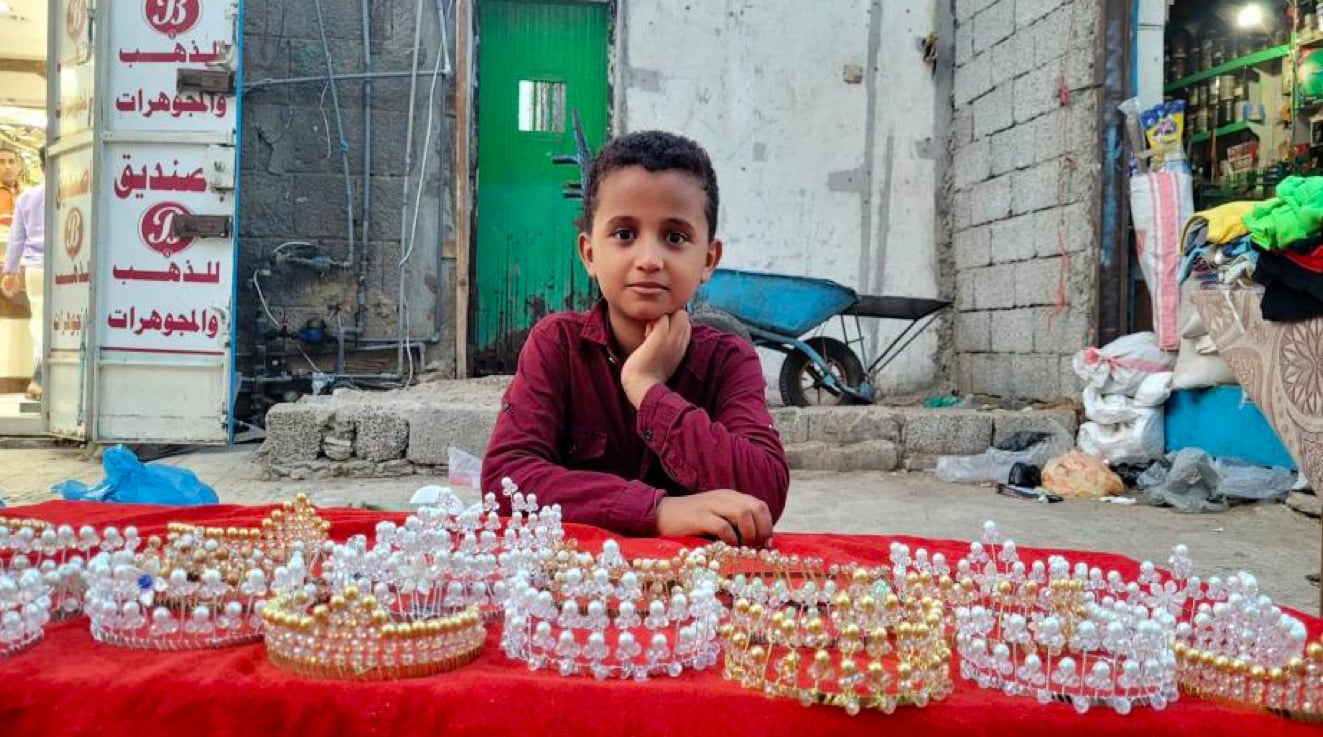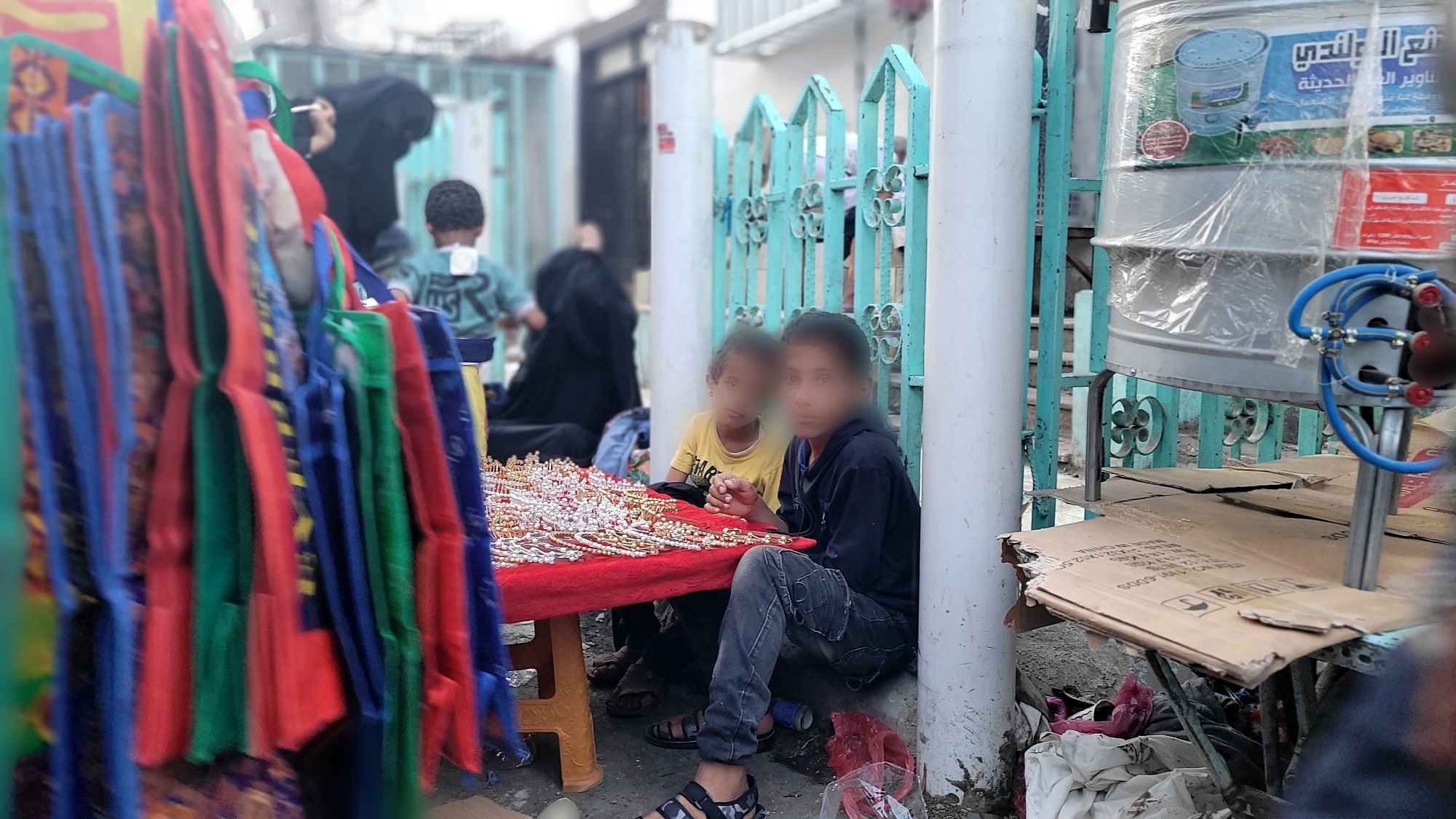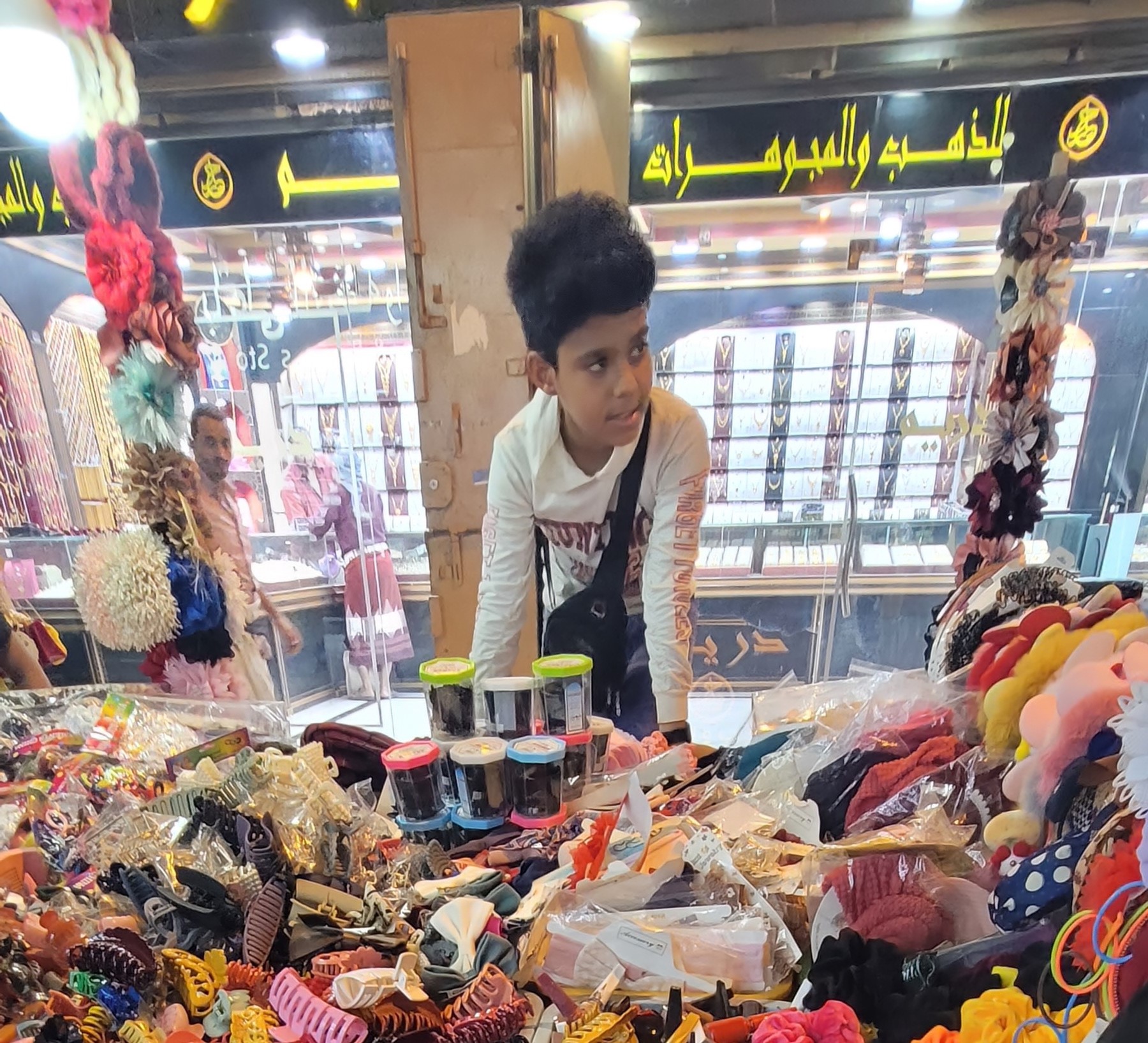
A child sells handmade ornaments in a market in Aden
Last updated on: 14-07-2022 at 3 PM Aden Time

Reem Al-Fadhli (South24)
Among big crowds in the middle of Al-Zahab street (the Gold Sstreet) in Sheikh Othman district in the Southern city of Aden, Bushra Sultan a 10 years old girl stands with a cardboard in front of her in which she put her little merchandise of handmade ornaments made by her and her sisters.
Meanwhile, her 8 year old younger brother Hammod roams the same street back and forth carrying the same handmade ornaments to sell them. The two children refused to be photographed.
Bushra and Hammod are two of hundreds of children in Aden who suffer from life hardships and child labor while their peers play with small puppets. With the continuous 8-year grinding war in Yemen, the deteriorating economic conditions have led to a remarkable increase of the child labor phenomenon.
In Yemen, the country which suffers from the world's worst humanitarian crisis since 2015 according to international reports [1], Law 45 for child rights in the state [2] issued in 2002 which forbids child labor remains locked in drawers.
While many families have to push their children to the labor market due to hunger and poverty, others do this in order to make fast financial gains. Moreover, Marginalized and homeless children are being exploited in hard work in return for low salaries.
The need
Basically, the children of displaced families from war areas in North Yemen and the African refugees' children are in the forefront of top child labor in Aden. They work in various professions including restaurants, workshops, shops, stalls, car washing and cleaning.
Economic expert Dr. Ali Al-Saqqaf told "South24" that "this phenomenon is not a new one but it dates back to the pre-war era. However, it has increased due to the ongoing war which began in 2015".

Two children sell handmade ornaments in a market in Aden (South24)
He added: "These children work on the street platforms selling napkins and other goods as well as cleaning cars. Before the war, child labor focused on workshops, laboratories and car denting".
He added: "It is also remarkable that children who work in the streets and the street vendors are basically displaced people who moved to Aden from governorates in which war rages".
Al-Saqqaf noted that "there are no short-term or middle-term solutions for child labor in Aden and other governorates without the end of war". He said: "After that, this phenomenon can relatively decrease".
Psychological effects
Abdullah Abdulkarim a 13 year old boy came from the Northern city of Taiz to support his family by selling mobile phone accessories on the roadside in Aden".
We asked Abdullah about details to make a better understanding of his conditions. He told us that he lives in a local hotel without any of his family members who live in a village in Taiz".
Abdullah and his peers face big risks due to their young age. This early labor and its possible accompanying negatives risk long-term psychological impact according to the psychological expert Ramz Azhar.
Azhar told "South24" that "the children’s engagement in the labor market at this early age makes them subjected to a lot of positions and incidents that give them passive experience which does not suit their young age".
He added: "The child in different stages of his life needs a lot of psychological and physical requirements. If those requirements are not available, his growth won't be on a sound one".
He added: "The labor market is an environment which is full of negative aspects and incidents which even affect adults. Thus, its impact on the child during the building character stage is double and harsh at most times".
The expert stressed that “working children are subject to a lot of psychological disturbances as a result of being hit by many traumas such as sexual molestation, psychological and physical attacks which basically impact their self-configuration".
He noted that such a thing largely prepares them to commit a lot of negative things which harm them and their communities".
Lack of awareness
In a market yard in the capital city of Aden, we met an 11 year old child called Mohammed. He tied a small black box around his waist in which he collects revenues emanating from selling female accessories".
We asked Mohammed about the reason behind working in this age. The young seller who stands next to him replied in a very firm and confident way: "His father wants him to engage in work to learn selling and purchasing methods early".

The child Mohammed who sells female accessories in a market in Aden (South24)
Many fathers push their children to the labor market in order to train them on working at an early age without awareness of the harms emanated from that".
On this regard, Azhar said: "These behaviors are a result of their parents' lack of awareness and ideologization which claim that there is a need to raise a child to do hard and difficult work to be able to confront life in an early age"
"Unfortunately, this thinking is among common wrong ideas which became a source of brag by those fathers who adopt it" he added.
He elaborated: "These wrong practices against children cause many psychological troubles and push them in the face of events which they shouldn't face in this young age where their minds are still in the stage of learning and configuration".
The change in community structure
In a previous report [3], International Labour Organization said that 1.4 million Yemeni children work in circumstances in which they don't enjoy their rights and that 34.3% of children between 5-17 work in the country. The organization added that this percentage increased many times after the outbreak of war.
In this regard, sociologist Sabrin Al-Saadi told "South24" that "the most important changes in the society which accepts child labor is the chaos of the education system because many working children drop out schools".
She said: "These changes produce many troubles which are instilled within the child who works at an earlier age. This produces several traits such as hatred and envy around him and his family. This makes him an easy prey to resort to violence as a way to restore the rights".
She added: "These results are due to many problems including the absence of the role of families and the lack of their awareness of the danger related to this matter. Children belonging to disintegrated families are more sustainable to engage in the labor market".
The expert noted that "there are fathers who suffer from diseases or drug addiction push their children into the labor market at an early age and they hold them responsible for the spending.” She added: "This is a form of evasion and disclaiming".
On how the spread of child labor impact the community structure, she said: "This would cause big ramifications. The natural growth of human beings is connected with several age stages each of which has to be lived with all of its details".

A child who sells perfume in a market in Aden (South24)
She added: "The lack of discipline in this process produces flaws. Thus, the natural structure of the community changes to be an unbalanced society. This happens when children become the breadwinners of their families who rely on them".
She stressed that "the child labor is not a problem in its own but a result of many community flaws".
With the ongoing war which apparently won't end soon, the sharp humanitarian crisis will continue accompanied with several features such as child labor. This comes at a time when all parties are busy in the conflict.
The ongoing internal displacement waves in Aden along with the African refugee waves in the overcrowded city will aggravate the child labor. So far, it does not appear that this issue attracts any attention from the relevant parties.